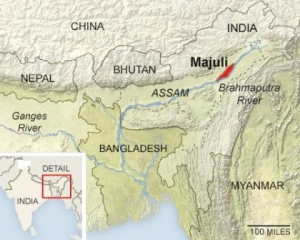- The fluvial riverine island is formed by the Brahmaputra river system.
- It is surrounded by Subanisri River in the North, main Brahmaputra River on the South and kherkatia Suli, split channel of Brahmaputra River in northeast.
- The island has total 144 villages with a population of over 160,000 and a density of 300 individuals per square km.
- Majuli island is mostly inhabited by Mishing tribal people. Apart from them, there are inhabitants from the Deori and Sonowal Kacharis tribes.
- On the island languages spoken are Mising, Assamese, and Deori Majuli island has a rich and diverse agricultural tradition.
- As many as 100 varieties of rice grown organically i.e. without pesticides or artificial fertilisers.
- It is the nerve centre of Assamese neo-Vaishnavite culture initiated by saint-reformer Srimanta Sankardeva in 15th century.
- The island had some 65 satras (monasteries adhering) to Vaishnavism. But large numbers of them were relocated to the mainland after being washed away.
- It is home of many rare and endangered avifauna species including migratory birds.
- Due to erosion of river-bank, the island has lost around one-third of its area in the last 30-40 years caused mainly due to frequent flooding of the river.
- In June 2016, Assam Government had officially declared the island as the district making it India’s first island district.
- The island has been nominated for the World Heritage Site status. It has been included in the tentative list by UNESCO.
- Why in news?
- The Guinness World Records has officially designation Assam’s Majuli as the largest river island in the world.
- It has become first island district of India.
